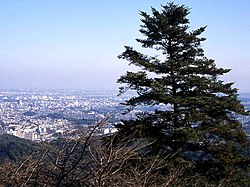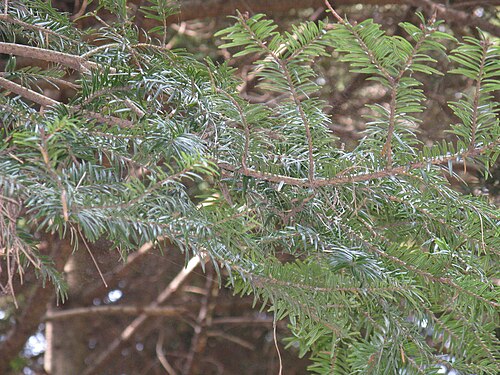Difference between revisions of "Abies firma"
(Created page with '{{SPlantbox |familia=Pinaceae |genus=Abies |species=firma |common_name=Japanese fir |name_ref=Flora - A Gardener's Encyclopedia |habit=tree |habit_ref=Flora - A Gardener's Ency…') |
|||
| Line 1: | Line 1: | ||
{{SPlantbox | {{SPlantbox | ||
|familia=Pinaceae | |familia=Pinaceae | ||
| − | |genus=Abies | + | |genus=Abies |
| − | |species=firma | + | |species=firma |
|common_name=Japanese fir | |common_name=Japanese fir | ||
|name_ref=Flora - A Gardener's Encyclopedia | |name_ref=Flora - A Gardener's Encyclopedia | ||
| Line 21: | Line 21: | ||
|usda_ref=Flora - A Gardener's Encyclopedia | |usda_ref=Flora - A Gardener's Encyclopedia | ||
|max_zone=9 | |max_zone=9 | ||
| − | |image= | + | |image=Abies firma3.JPG |
|image_width=240 | |image_width=240 | ||
}} | }} | ||
| − | + | '''Momi Fir''' (''Abies firma'') is a species of [[fir]] native to central and southern [[Japan]], growing at low to moderate altitudes of 50-1600 m. | |
| + | |||
| + | It is a medium-sized to large [[evergreen]] [[Pinophyta|coniferous]] [[tree]] growing to 50 m tall and 2 m in trunk diameter, with a broad conical crown of straight branches rising at an angle of about 20° above horizontal. The [[bark]] is scaly grey-brown, with resin blisters on young trees. The shoots are grooved, buff to grey-brown, glabrous or finely pubescent. The [[leaf|leaves]] ("needles") are flattened, 2-5 cm long and 2-4 mm broad, spread at nearly right angles from the shoot; the apex is sharp, bifid (double-pointed) on the leaves of young trees, single-pointed on mature trees. They are bright green above, and greyish-green below with two broad [[stoma]]tal bands. The [[conifer cone|cones]] are 7-15 cm long by 3-5 cm wide, green maturing yellow-brown, tapering to a 2-3 cm broad bluntly rounded apex. The scale bracts are exserted 3-6 mm, triangular. The [[seed]]s are 7-9 mm long with a wedge-shaped wing 1.5 cm long, are released after the cones disintegrate at maturity in October. | ||
| + | |||
| + | Momi Fir is sometimes, but not commonly, used as an [[ornamental tree]], particularly in warm temperate regions with hot, humid summers such as the southeastern [[United States]]. | ||
==Cultivation== | ==Cultivation== | ||
| Line 40: | Line 44: | ||
==Gallery== | ==Gallery== | ||
<gallery perrow=5> | <gallery perrow=5> | ||
| − | + | File:Abies firma2.jpg| photo 1 | |
| − | + | File:Abies firma3.jpg| photo 2 | |
| − | + | File:Abies firma1.jpg| photo 3 | |
</gallery> | </gallery> | ||
Latest revision as of 18:18, 29 June 2010
| Habit | tree
| |
|---|---|---|
| Height: | ⇕ | 100 ft"ft" can not be assigned to a declared number type with value 100. |
| Width: | ⇔ | 20 ft"ft" can not be assigned to a declared number type with value 20. |
| Lifespan: | ⌛ | perennial |
| Exposure: | ☼ | sun |
|---|---|---|
| USDA Zones: | 6 to 9 |
|
Pinaceae > |
Abies > |
firma > |
Momi Fir (Abies firma) is a species of fir native to central and southern Japan, growing at low to moderate altitudes of 50-1600 m.
It is a medium-sized to large evergreen coniferous tree growing to 50 m tall and 2 m in trunk diameter, with a broad conical crown of straight branches rising at an angle of about 20° above horizontal. The bark is scaly grey-brown, with resin blisters on young trees. The shoots are grooved, buff to grey-brown, glabrous or finely pubescent. The leaves ("needles") are flattened, 2-5 cm long and 2-4 mm broad, spread at nearly right angles from the shoot; the apex is sharp, bifid (double-pointed) on the leaves of young trees, single-pointed on mature trees. They are bright green above, and greyish-green below with two broad stomatal bands. The cones are 7-15 cm long by 3-5 cm wide, green maturing yellow-brown, tapering to a 2-3 cm broad bluntly rounded apex. The scale bracts are exserted 3-6 mm, triangular. The seeds are 7-9 mm long with a wedge-shaped wing 1.5 cm long, are released after the cones disintegrate at maturity in October.
Momi Fir is sometimes, but not commonly, used as an ornamental tree, particularly in warm temperate regions with hot, humid summers such as the southeastern United States.
Cultivation
Propagation
Pests and diseases
Varieties
Gallery
References
External links
- w:Abies firma. Some of the material on this page may be from Wikipedia, under the Creative Commons license.
- Abies firma QR Code (Size 50, 100, 200, 500)



